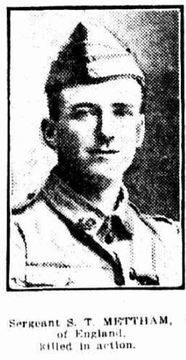Pte
Sydney Thomas Mettham
Information about birth
|
Date of birth: 07/01/1888 |
|
Place of birth: Sheffield, Yorkshire, England, United Kingdom |
General information
|
Last known residence: 244 Exhibition Street, Melbourne, Australia |
|
Profession: Musician |
|
Religion: Church of England |
Army information
|
Country: Australia |
|
Force: Australian Imperial Force |
|
Rank: Private |
|
Service number: 1987 |
|
Enlistment date: 21/01/1915 |
|
Enlistment place: Melbourne, Victoria, Australia |
|
Units: — Australian Infantry, 5th Bn. (Last known unit) |
Information about death
|
Date of death: 20/09/1917 |
|
Place of death: Glencorse Wood, Zonnebeke, Belgium |
|
Cause of death: Killed in action (K.I.A.) |
|
Age: 29 |
Cemetery
|
Tyne Cot Cemetery Plot: XXXI Row: G Grave: 18 |
Distinctions and medals 2
|
British War Medal Medal |
|
Victory Medal Medal |
Points of interest 3
| #1 | Place of birth | ||
| #2 | Enlistment place | ||
| #3 | Place of death (approximate) |
My story
Sydney Thomas Mettham was born May 16, 1887, the son of George and Rebecca Mettham in Sheffield, Yorkshire, England. He migrated to Australia and enlisted in the Australian Army. His brother, George Eldon Mettham also served. Sydney was assigned to the 5th Australian Infantry Battalion, 2nd Brigade, 1st Division. Frederick was killed on September 20, 1917, during the battle known as the Battle of the Menin Road. It was part of the larger battle of Passchendaele. 2nd Brigade managed to take the German positions. Frederick's battalion did lose 67 soldiers; 12 others went missing.
The final objective of 2nd Australian Brigade on Sept. 20, 1917, was the capture of the western part of Polygon Wood. The attack was divided into the capture of a red, blue and green line. The role of the 5th Australian Battalion was to capture the area up to and including the blue line, which was approximately at the level of Black Watch Corner. The supporting artillery opened fire exactly at the appointed time and the Australians managed to take the German bunkers. A number of soldiers, according to the logs, moved up too quickly, being hit by their own artillery. There were also casualties on the left flank, where the German machine guns had not been deactivated. After eliminating the last pockets of resistance, the battalion was able to consolidate its positions around the blue line. German prisoners of war helped carry off the wounded.
Fifth Battalion logs describe the attack as a great success. An important note here is the number of slachotffers that fell. About a hundred soldiers fell victim to friendly cannon fire and German machine guns also inflicted casualties. Sydney Thomas Mettham was one of the casualties and his militia dosier states that he was buried some 300 yards from Glencorse Wood. However, the Commonwealth War Graves Commission burial sheet lists Polygon Wood as the place where he was exhumed some three years later. Identification was then made from his ground sheet/raincape. Currently resting in Tyne Cot Cemetery, he was 30 years old.
The final objective of 2nd Australian Brigade on Sept. 20, 1917, was the capture of the western part of Polygon Wood. The attack was divided into the capture of a red, blue and green line. The role of the 5th Australian Battalion was to capture the area up to and including the blue line, which was approximately at the level of Black Watch Corner. The supporting artillery opened fire exactly at the appointed time and the Australians managed to take the German bunkers. A number of soldiers, according to the logs, moved up too quickly, being hit by their own artillery. There were also casualties on the left flank, where the German machine guns had not been deactivated. After eliminating the last pockets of resistance, the battalion was able to consolidate its positions around the blue line. German prisoners of war helped carry off the wounded.
Fifth Battalion logs describe the attack as a great success. An important note here is the number of slachotffers that fell. About a hundred soldiers fell victim to friendly cannon fire and German machine guns also inflicted casualties. Sydney Thomas Mettham was one of the casualties and his militia dosier states that he was buried some 300 yards from Glencorse Wood. However, the Commonwealth War Graves Commission burial sheet lists Polygon Wood as the place where he was exhumed some three years later. Identification was then made from his ground sheet/raincape. Currently resting in Tyne Cot Cemetery, he was 30 years old.
Connection to other soldiers 1
|
George Eldon Mettham
Brother |
Sources 5
|
5th Battalion Australian Infantry, (Australian War Memorial, Campbell (AWM), AWM4 23/22/31). https://www.awm.gov.au Sources used |
|
First Australian Imperial Force Personnel Dossiers, 1914-1920, (National Archives of Australia, Canberra (NAA), B2455, Freame E). https://recordsearch.naa.gov.au Sources used |
|
McCarthy, Chris. Passchendaele: The Day by Day Account (Londen: Arms & Armour Press, 2018), 81. Sources used |
|
Sheffield and Rotherham, Yorkshire, England, Church of England Baptisms, 1813-1923, Anglican Parish Registers. Sheffield, England: Sheffield City Council. http://www.sheffield.gov.uk/archives Sources used |
|
Sydney Thomas Mettham, the Australia, Electoral Rolls, 1903-1980. https://www.ancestry.com Sources used |
More information 4
|
CWGC https://www.cwgc.org/find-records/find-war-dead/casualty-details/463942 |
|
Namenlijst (In Flanders Fields Museum) https://namenlijst.org/publicsearch/#/person/_id=78503142-8d18-4b90-9681-56f88d5af6ca |
|
Lives of the First World War (Imperial War Museum) https://livesofthefirstworldwar.iwm.org.uk/lifestory/7545247 |
|
The AIF Project (UNSW Canberra) https://aif.adfa.edu.au/showPerson?pid=207201 |
